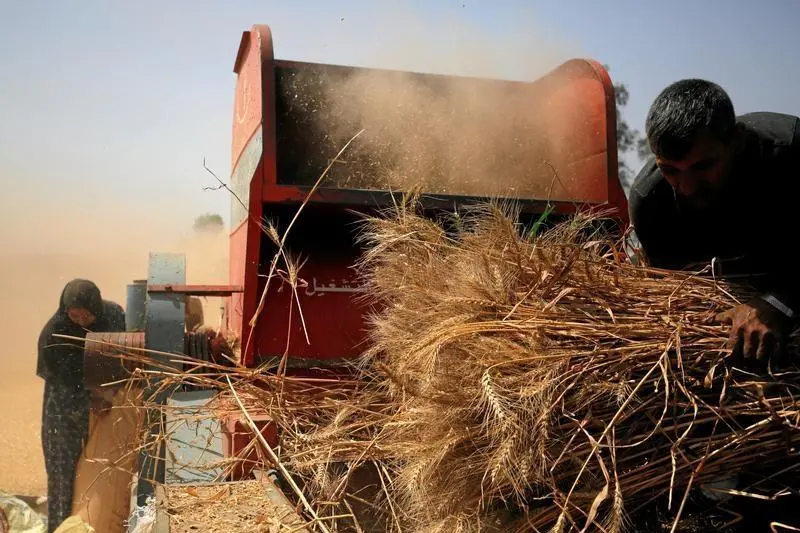PHOTO
DUBAI/CAIRO- Egypt's agriculture ministry said on Wednesday it was awaiting a cabinet ruling after a court reinstated a ban on wheat imports containing the common ergot fungus, renewing uncertainty over a policy that has disrupted trade.
The world's largest wheat buyer stunned grain markets last year when it imposed a zero tolerance level on ergot, prompting a supplier boycott of state tenders until Egypt adopted a tolerance of 0.05 percent, a common international standard.
Tuesday's court ruling cancelled that decree, according to a lawyer that raised the case.
Inspectors at the state quarantine service say even traces of ergot can harm plant and animal health but other officials at the agriculture ministry, which supervises the service, as well as the supply and trade ministries, back the 0.05 percent standard.
"The ruling was against a decision that was issued by the cabinet so we have to await directions from there to know whether it will affect our process," Hamid Abdel Dayim, spokesman for the ministry told Reuters. "Until then it is business as usual," he said.
The flow of wheat in Egypt is politically sensitive because it is used by the government to supply a sprawling bread subsidy programme relied on by tens of millions of Egyptians at a time of economic austerity.
Dayim said the court ruling would be retroactive, suggesting it could affect cargoes already contracted under the less stringent ergot standard. Suppliers say it is impossible to guarantee a zero ergot standard.
"I expect it to cause market confusion once again but I don't expect anything to change on the ground as a result of the ruling," said one Cairo-based trader.
BACK TO ZERO
Traders selling to Egypt have grown accustomed to what they say are volatile import rules and erratic inspection procedures that have driven up the cost of doing business, leading many suppliers to add risk premiums of up to $500,000 per cargo.
To streamline its import procedures and put an end to the ergot-driven trade row, Egypt this year introduced a new food inspection system that reduced the role of the agriculture quarantine service, halting the practice of sending them abroad to check cargoes and hiring private companies instead.
A group of inspectors successfully challenged that inspection system in court, arguing that it allowed for harmful contaminants to enter the country. That ruling, which also could have restored the zero ergot standard, was never implemented and is being appealed.
Traders say inspectors have halted shipments at Egyptian ports and heightened inspection measures to put pressure on the government to reverse course and scrap the new inspection regime.
The inspectors say they are trying to stop bad wheat getting into Egypt and deny they are seeking a return to expenses paid overseas inspection trips. Some inspectors say checks at Egyptian ports are now tougher because importers are sending back poor-quality grains.
Some traders feared this week's ruling, if implemented, could return Egypt to last year's gridlock, when wary suppliers faced with the zero ergot rule felt the risk of doing business was too high and shunned tenders entirely. That effectively cut off Egypt from global grain markets.
"This will take us back to the zero point, which will lead to zero offers in tenders and a lack of supply for the private sector," said Hesham Soliman, president of Med Star for Trading, a private sector grain trading company.
(Reporting By Maha El Dahan and Eric Knecht; Editing by Jon Boyle) ((Maha.Dahan@thomsonreuters.com; + 9712 4082101; Reuters Messaging: maha.dahan.thomsonreuters.com@reuters.net))
The world's largest wheat buyer stunned grain markets last year when it imposed a zero tolerance level on ergot, prompting a supplier boycott of state tenders until Egypt adopted a tolerance of 0.05 percent, a common international standard.
Tuesday's court ruling cancelled that decree, according to a lawyer that raised the case.
Inspectors at the state quarantine service say even traces of ergot can harm plant and animal health but other officials at the agriculture ministry, which supervises the service, as well as the supply and trade ministries, back the 0.05 percent standard.
"The ruling was against a decision that was issued by the cabinet so we have to await directions from there to know whether it will affect our process," Hamid Abdel Dayim, spokesman for the ministry told Reuters. "Until then it is business as usual," he said.
The flow of wheat in Egypt is politically sensitive because it is used by the government to supply a sprawling bread subsidy programme relied on by tens of millions of Egyptians at a time of economic austerity.
Dayim said the court ruling would be retroactive, suggesting it could affect cargoes already contracted under the less stringent ergot standard. Suppliers say it is impossible to guarantee a zero ergot standard.
"I expect it to cause market confusion once again but I don't expect anything to change on the ground as a result of the ruling," said one Cairo-based trader.
BACK TO ZERO
Traders selling to Egypt have grown accustomed to what they say are volatile import rules and erratic inspection procedures that have driven up the cost of doing business, leading many suppliers to add risk premiums of up to $500,000 per cargo.
To streamline its import procedures and put an end to the ergot-driven trade row, Egypt this year introduced a new food inspection system that reduced the role of the agriculture quarantine service, halting the practice of sending them abroad to check cargoes and hiring private companies instead.
A group of inspectors successfully challenged that inspection system in court, arguing that it allowed for harmful contaminants to enter the country. That ruling, which also could have restored the zero ergot standard, was never implemented and is being appealed.
Traders say inspectors have halted shipments at Egyptian ports and heightened inspection measures to put pressure on the government to reverse course and scrap the new inspection regime.
The inspectors say they are trying to stop bad wheat getting into Egypt and deny they are seeking a return to expenses paid overseas inspection trips. Some inspectors say checks at Egyptian ports are now tougher because importers are sending back poor-quality grains.
Some traders feared this week's ruling, if implemented, could return Egypt to last year's gridlock, when wary suppliers faced with the zero ergot rule felt the risk of doing business was too high and shunned tenders entirely. That effectively cut off Egypt from global grain markets.
"This will take us back to the zero point, which will lead to zero offers in tenders and a lack of supply for the private sector," said Hesham Soliman, president of Med Star for Trading, a private sector grain trading company.
(Reporting By Maha El Dahan and Eric Knecht; Editing by Jon Boyle) ((Maha.Dahan@thomsonreuters.com; + 9712 4082101; Reuters Messaging: maha.dahan.thomsonreuters.com@reuters.net))





















